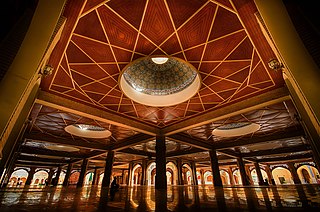Razi or al-Razi is a name that was historically used to indicate a person coming from Ray, Iran.
The Hanbali school or Hanbalism is one of the four major schools of Islamic jurisprudence within Sunni Islam. It is named after and based on the teachings of the 9th-century scholar, jurist and traditionist Ahmad ibn Hanbal, and later institutionalized by his students. It is the smallest and most strictly traditionalist of the four major Sunni schools, the others being the Hanafi, Maliki and Shafi'i schools.
The Maliki school or Malikism is one of the four major schools of Islamic jurisprudence within Sunni Islam. It was founded by Malik ibn Anas in the 8th century. The Maliki school of jurisprudence relies on the Quran and hadiths as primary sources. Unlike other Islamic fiqhs, Maliki fiqh also considers the consensus of the people of Medina to be a valid source of Islamic law.

The House of Wisdom, also known as the Grand Library of Baghdad, was believed to be a major Abbasid-era public academy and intellectual center in Baghdad. In popular reference, it acted as one of the world's largest public libraries during the Islamic Golden Age, and was founded either as a library for the collections of the fifth Abbasid caliph Harun al-Rashid in the late 8th century or as a private collection of the second Abbasid caliph al-Mansur to house rare books and collections of poetry in the Arabic language. During the reign of the seventh Abbasid caliph al-Ma'mun, it was turned into a public academy and a library.

Kufa, also spelled Kufah, is a city in Iraq, about 170 kilometres (110 mi) south of Baghdad, and 10 kilometres (6.2 mi) northeast of Najaf. It is located on the banks of the Euphrates River. The estimated population in 2003 was 110,000. Currently, Kufa and Najaf are joined into a single urban area that is mostly commonly known to the outside world as 'Najaf'.
Abū al-ʿAbbās is an Arabic name that may refer to:
Abū al-Faraj Muḥammad ibn Isḥāq an-Nadīm, also Ibn Abī Yaʿqūb Isḥāq ibn Muḥammad ibn Isḥāq al-Warrāq, and commonly known by the nasab (patronymic) Ibn an-Nadīm, was a Muslim bibliographer and biographer of Baghdad who compiled the encyclopedia Kitāb al-Fihrist.
Banū Tamīm is an Arab tribe that originated in Najd in the Arabian Peninsula. It is mainly present in Saudi Arabia, Qatar, Kuwait, Iraq, Jordan and Lebanon, a strong presence in Algeria, and Morocco, Palestine, Tunisia, and Libya. It is also present in many other parts of the Arab world such as Egypt and Khuzestan in Iran. The word Tamim in Arabic means strong and solid. It can also mean those who strive for perfection.

Abū Bakr is an Arabic given name meaning "Father of a Young Camel" that is widely used by Sunni Muslims.
Baghdadi or Al-Baghdadi may refer to:
Shams al-Din is an Arabic personal name or title.

'Abd al-Karīm ibn Hawazin Abū al-Qāsim al-Qushayrī al-Naysābūrī was an Arab Muslim scholar, theologian, jurist, legal theoretician, commentator of the Qur’an, muhaddith, grammarian, spiritual master, orator, poet, and an eminent scholar who mastered a number of Islamic sciences. Al-Qushayri, combined the routine instruction of a Shafi'i law specialist and Hadith expert (muhaddith) with a solid slant to mysticism and ascetic lifestyle.

Muhammad al-Rudani was a Moroccan polymath who was active as an astronomer, grammarian, jurist, logician, mathematician and poet.
The Ẓāhirī school or Zahirism is a Sunnī school of Islamic jurisprudence founded in the 9th century by Dāwūd al-Ẓāhirī, a Muslim scholar, jurist, and theologian of the Islamic Golden Age. It is characterized by strict adherence to literalism and reliance on the outward (ẓāhir) meaning of expressions in the Quran and ḥadīth literature; the consensus (ijmāʿ) of the first generation of Muhammad's closest companions (ṣaḥāba), for sources of Islamic law (sharīʿa); and rejection of analogical deduction (qiyās) and societal custom or knowledge (urf), used by other schools of Islamic jurisprudence.
al-Samarqandi or Samarqandi is a nisba meaning "from Samarqand", a city in Central Asia, in modern Uzbekistan. It may refer to:
This page is based on this
Wikipedia article Text is available under the
CC BY-SA 4.0 license; additional terms may apply.
Images, videos and audio are available under their respective licenses.





